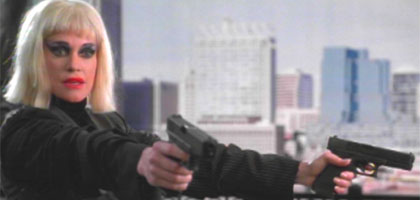
Cecil B. Demented
USA/France 2000

Reviewed by Peter Matthews
Synopsis
Our synopses give away the plot in full, including surprise twists.
Hollywood star Honey Whitlock (Melanie Griffith) agrees to attend the premiere of her new film Some Kind of Happiness in Baltimore, Maryland, the movie's location. The gala's venue, the Senate Theatre, is infiltrated by the Sprocket Holes, a cadre of cinematic terrorists led by guerrilla film-maker Cecil B. Demented, otherwise known as Sinclair Stevens (Stephen Dorff), the Senate's manager. The Sprockets kidnap Honey and tell her of their plan to force her to star in a subversive epic called Raving Beauty. Initially scornful, she is soon converted and joins the gang in a series of assaults on mainstream cinema locales: first, they disrupt a showing of Patch Adams: the Director's Cut while Cecil films the mayhem; then they invade an outdoor reception held by the Maryland Film Commission. Make-up artist Rodney (Jack Noseworthy) is killed when police fire on the Sprockets. Pursued by a mob of conservative filmgoers, the outlaws take refuge in a cinema screening a karate marathon and rouse the action fans to protect them.
Back at the hide-out, Cecil tells of his plan to stage a coup d'état at the location where the sequel to Forrest Gump, Gump Again, is being filmed. This time, Honey's co-star Lyle (Adrian Grenier) is gunned down by a technician and angry Teamsters chase the terrorists into a cinema showing the works of ex-porn star Cherish (Alicia Witt). Again, the Sprockets are defended, this time by exploitation fans. Cecil's final location is a drive-in cinema playing a Honey Whitlock triple bill. When the police arrive, more Sprockets are killed, Cecil immolates himself and Honey is escorted into a police van, while adoring fans look on.
Review
Of all the directors who have made names for themselves over the past 30 years, John Waters is possibly the most critic-proof. It would be a stretch to call the perpetrator of such midnight-movie classics as Female Trouble (1974) and Polyester (1981) an artist, but he's undoubtedly some kind of auteur. Even with the modest commercial budgets vouchsafed to him nowadays, Waters has stayed true to his own brand of flaky amateurism: the flat, ugly staging, the frowzy cinematography and the cheesily outré set design one finds in his films supply an authorial signature as patent as Orson Welles' use of deep focus. There's a conscious ironic sensibility in Waters' movies that lifts them out of the barrel-scraping Ed Wood class. His amiable grotesques find a paradoxical grace in their abjection (as in the competition to be the "filthiest person alive" in Pink Flamingos, 1972). Indeed, one could argue an interesting case for Waters' mystical Catholic leanings if that weren't too pompous a way of addressing a film-maker whose charm lies in his utter lack of pretension. Attacking a Waters movie on aesthetic grounds seems as redundant an activity as lamenting the culinary deficiencies of tinned spaghetti. His films are so blissfully aware of their own tackiness that they're just about impossible to resist.
Despite its high quotient of masturbation gags, Cecil B. Demented is as pleasantly anodyne as all Waters' recent productions. Just as Hollywood has cottoned on to the lucrative possibilities of gross-out comedies, Waters has started making pictures you could show to your Aunt Eileen. No doubt the mainstream invasion of his underground turf obliged him to move on, but there was always a touch of Capra about Waters' films. The sick-making coda to Pink Flamingos (Divine cheekily munches on a dog turd) doesn't carry the transgressive force it would in, say, Buñuel - it's more in the nature of a schoolboy dare.
The oddly wholesome quality of Waters' obscenity is probably a function of how he relates to his characters. For Waters never presents a mere freak show à la Todd Solondz; far from laughing up his sleeve at the human dregs he portrays, Waters bows to their lumpen integrity. The shoddiness of his cinema should consequently be recognised for the principled moral gesture it is - even on the level of style, Waters is determined not to pull rank.
If Cecil B. Demented represents a technical advance over its predecessors, that isn't saying much. Waters displays a new penchant for mock-pretty effects (as in the rim lighting of the gala sequence) and proves he can handle action scenes skilfully enough. Otherwise, it's the same dog's breakfast as before, only this time the rough aesthetic bears a quasi-political import. Ever since he took the mickey out of the race-relations message movie in Hairspray, Waters has been developing the semblance of a social conscience: here he attacks our soulless multiplex era, bloated by formulaic high-concept drivel. In a witty conflation of Patty Hearst's escapades with the Symbionese Liberation Army and the Dogme group's drive for cinematic purity, Cecil B. Demented tells how screen diva Honey Whitlock gets brainwashed by a clan of movie-mad terrorists, the Sprocket Holes. Waters' native Baltimore serves as the benchmark of authenticity - its nameless genre fans offer sanctuary to the Sprocket Holes whenever the forces of reaction threaten - and the premise allows for plenty of swipes at corporate Hollywood. But story structure not being Waters' strong card, the film dawdles and repeats itself to the point of exhaustion. And hard as the professional actors try, they lack the spark of genuine dementia Waters formerly elicited from personal 'discoveries' such as Mink Stole (who makes a brief appearance). Stephen Dorff in particular is strangely flat as the eponymous messianic Sprockets leader. But Melanie Griffith throws herself into the part of Honey as if clutching at last straws. What used to be said of Walt Disney seems true of Waters: he gets them on the way up (Johnny Depp in Cry-Baby) and also on the way down.
Credits
- Director
- John Waters
- Producers
- Joe Caracciolo Jr
- John Fiedler
- Mark Tarlov
- Screenplay
- John Waters
- Director of Photography
- Robert Stevens
- Editor
- Jeffrey Wolf
- Production Designer
- Vincent Peranio
- Music
- Zoë Poledouris
- Basil Poledouris
